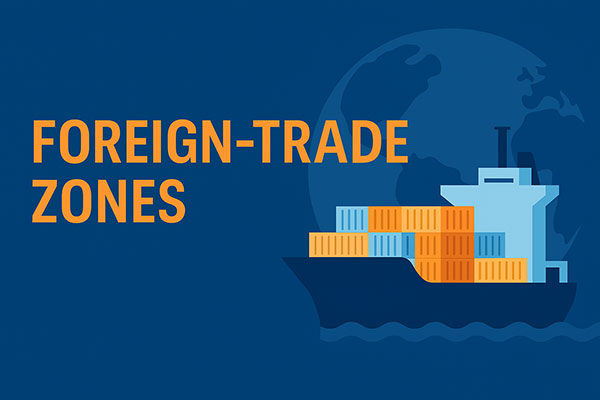This holiday season is bringing the usual spike in freight volume, but some companies are finding a way to ease the pressure. More U.S. businesses are turning to Foreign-Trade Zones to lower costs, build inventory earlier, and stay ahead of shipping disruptions. To better understand how the program works, we spoke with Jeff Tafel, President of the National Association of Foreign-Trade Zones.
What’s Related
Supply Chain 24/7: For those who aren’t familiar, what exactly is a Foreign-Trade Zone, and how does it work in practice for U.S. companies?
Jeff Tafel: A U.S. Foreign-Trade Zone (FTZ) is a secure, designated site in the U.S. where companies can bring in foreign or domestic merchandise and conduct a range of operations – everything from storage and distribution to manufacturing – under special U.S. Customs procedures. They’re administered at the local level by economic development entities and overseen by U.S. Customs and Border Protection (CBP).
In practice, U.S. FTZs help companies streamline their supply chains by allowing them to defer or reduce certain customs duties. Goods can move in and out of a zone more efficiently, giving U.S.-based operations a cost advantage and making them more competitive in the global marketplace.
SC247: How are U.S. FTZs helping companies manage inventory and shipping costs during this year’s peak season?
JT: This year’s peak season has been especially challenging, and companies using U.S. FTZs are navigating it with far more flexibility. The zones allow businesses to build up inventory earlier, without immediately paying duties, so they’re better positioned to respond to demand spikes. Companies can also consolidate shipments and process goods more efficiently within the zone, helping them control warehousing and transportation costs. In a period of tight capacity and volatile freight rates, that flexibility is incredibly valuable.
SC247: What are the biggest changes you’re seeing in tariff and trade policy, and how do FTZs help companies adapt?
JT: We’re entering another year of policy adjustments, with new tariff reviews and continued trade pressures in key sectors. What we’re hearing from companies is a real need for predictability. U.S. FTZs give them a tool to manage that uncertainty. By operating inside a zone, companies can often reduce tariff exposure. They also gain the ability to respond quickly to policy changes by adjusting sourcing and production processes without disrupting their U.S. operations. In a shifting trade environment, these FTZs provide stability – and that’s becoming more critical every year.
SC247: Can you share an example of an industry currently using FTZs effectively?
 Jeff Tafel is President of the National Association of Foreign-Trade Zones
Jeff Tafel is President of the National Association of Foreign-Trade Zones
JT: We’re seeing a strong presence across several sectors – but automotive, aerospace, and consumer goods stand out. For example, many U.S. automotive manufacturers use FTZs to manage complex global supply chains. By bringing components into a zone and assembling vehicles domestically, they can streamline U.S. operations, reduce duty exposure, and keep production competitive here in the U.S.
We’re also seeing manufacturers in aerospace and electronics take advantage of the ability to stage inventory in a zone without immediately paying duties. That flexibility is especially valuable right now, with companies adapting to tariff changes and fluctuating demand. Whether a company is assembling large, high-value equipment or simply trying to manage inventory more efficiently, U.S. FTZs give them a toolset that helps reduce costs, improve cash flow and maintain smoother operations, especially in a volatile trade environment.
SC247: Are you seeing renewed interest in FTZs because of the ongoing transportation problems we’ve seen this year?
JT: Absolutely. Any time supply chains are strained, companies look hard at tools that offer more control, predictability, and cost efficiency – and U.S. FTZs fit squarely into that need. We’re seeing renewed interest from firms that want to buffer against congestion by repositioning inventory closer to customers, reducing duty exposure on volatile supply lines, and streamlining customs processes that can otherwise add friction during periods of heavy port activity.
U.S. FTZs also allow companies to hold or process goods in a secure, compliant environment without triggering duties until merchandise officially enters U.S. commerce. In an environment where transportation delays and logistics costs are top of mind, the flexibility and operational resilience that U.S. FTZs offer are resonating more than ever.
SC247: What advice would you give to companies that might be hearing about FTZs for the first time and want to explore whether they’re a good fit?
JT: Start by mapping your supply chain pain points – duties, inventory carrying costs, lead times, or compliance complexity – and compare them with the specific benefits that U.S. FTZs offer.
Many companies are surprised by how accessible the program has become: technology has simplified compliance, and U.S. Customs and Border Protection continues to modernize its procedures.
Further, I always recommend engaging early with your local U.S. FTZ grantee and a qualified consultant; they can help model the financial impact and determine whether savings from duty deferral, weekly entry, or logistical efficiencies are significant for your operation.
And importantly, companies shouldn’t assume they need to be massive manufacturers to participate. U.S. FTZs increasingly support distributors, e-commerce operations, and 3PLs. If international trade touches your business in any meaningful way, it’s worth exploring.
SC247: And on a lighter note — what’s one imported product you wish came straight through your favorite FTZ this holiday season so you wouldn’t have to wait for it?
JT: If I could route one product straight through a U.S. FTZ this season, it would probably be one of the latest high-demand electronics – those holiday-season gadgets that always seem to have lengthy shipping periods. If they could move through a U.S. FTZ and land on my doorstep a little faster, I certainly wouldn’t complain. And, like any U.S. FTZ operator would tell you: faster clearance, deferred duties, and fewer supply-chain surprises sure sound like a nice holiday gift!

